Photographs: Reuters BankBazaar.com
Budget 2010 gave a lot of hope to people in the country. There were many new schemes introduced by the government aiming at the growth and development of the country.
Although many promises have not yet seen the light of the day some of the schemes that were introduced have been successfully carried out.
Let's first see the promises that were kept by the government.
. . .
Budget: Promises that were kept and not kept
Photographs: Uttam Ghosh/Rediff.com
Personal income tax
The government introduced the new section 80CCF in the Income Tax Act to in the Budget 2010. This was introduced in order to promote investment in the infrastructure sector.
People had expected the value of exemption on tax under section 80C to go up to Rs 300,000 but that did not happen; rather the government introduced the 80CCF.
According to section 80CCF, long-term investments on infrastructure bonds with upper limit of Rs 20,000 shall be allowed as deduction in computing the income of an individual or a Hindu Undivided Family.
. . .
Budget: Promises that were kept and not kept
Photographs: Uttam Ghosh/Rediff.com
This deduction will be over and above the existing overall limit of tax deduction on savings of up to Rs 1 lakh (Rs 100,000) under section 80C, 80CCC and 80CCD of the Act.
The term of the bonds shall be a minimum of ten years with a lock-in period of five years for an investor.
These kinds of bonds were last issued in the year 2002 and 2003 but gradually started declining, and after the introduction of the 80CCF many companies have started issuing such bonds.
Some of the private companies, like Larsen & Toubro have also started issuing these bonds after Budget 2010.
. . .
Budget: Promises that were kept and not kept
Dilution of stake in PSU companies
The other exciting implementation of the Budget 2010 is the issue of the initial public offering (IPO). The government had announced that it was going to raise money through the IPOs that were to be issued in the year 2010.
According to the published data as on December 2010, the year 2010 has had 70 public issues out of which 62 IPOs and eight are follow-on public offerings (FPOs).
The total fund raised through these issues was about Rs 71,114 crore (Rs 711.14 billion). Of this, fund-raising through 62 IPOs was worth about Rs 39,710 crore (Rs 397.10 billion).
. . .
Budget: Promises that were kept and not kept
Photographs: Reuters
Recent reports suggest that the government has raised Rs 21,000 crore (Rs 210 billion) till the end of 2010 by cutting its stake in companies like Engineers India Ltd, Coal India Ltd, and MOIL Ltd.
This inflow has helped the government reduce the deficit by a huge extent.
National Rural Employment Guarantee Scheme
The NREGS had been given an allotment of Rs 40,000 crore (Rs 400 billion) to help unemployed people mainly in rural areas to earn some basic wage.
As of end of December an amount in excess of Rs 20,000 crore (Rs 200 billion) has been utilised and the balance also is being used.
Given a recent hike of minimum wage from January, a huge part of this amount could be utilised in the period from January to March.
. . .
Budget: Promises that were kept and not kept
Photographs: Uttam Ghosh/Rediff.com
PSU banks recapitalisation to ensure stability
Rs 16,500 crore (Rs 165 billion) had been budgeted for providing the Tier-I capital required for some PSU banks.
This was done with the intention to improve the lending capacity of these banks. Budget 2010 had also made additional provisions of capital for lending to rural areas.
The government exceeded this target and as on date the capital infusion into PSU banks during the fiscal year stands at over Rs 21,000 crore (Rs 210 billion).
This funding has helped these banks to support lending to agriculture and microfinance in a major way.
Now let us check out the promises that were not kept. . . .
Budget: Promises that were kept and not kept
Photographs: Uttam Ghosh/Rediff.com
Budget 2010 recap: Promises not delivered
Budget 2010 seemed to bring lots of hope in the minds of people regarding the new schemes and policies which were promised to be introduced.
The reports submitted by every ministry had coated many plans towards the growth of the country.
The Budget gave ears to the electric vehicle manufacturers where the finished vehicles had to pay only 4 per cent duty, the price of gold was expected to be lesser as the duty on gold ore had been shifted to specific duty.
The personal income tax slabs were increased; the prices of mobiles, watches and ready made garments were expected to go down.
But, did all that the finance minister promise really take place? Or was it a story of promises made, but, not delivered?
The following paragraphs take a view on what did not happen of all that was promised in Budget 2010.
. . .
Budget: Promises that were kept and not kept
Photographs: Reuters
Goods and Service Tax
The Goods and Service Tax is expected to replace all indirect taxes that are charged on goods and services by the Indian central and state governments.
According to the finance minister, the Goods and Service Tax along with Direct Tax Code were to come into force from April 1, 2011.
Current Status: GST was supposed to begin from the first of April 2011 it has been postponed by one year as the government requires more time for taking a stronger decision regarding the matter.
According to recent reports India's proposed new Goods and Service Tax is expected to roll out only in the month of April 2012 due to the continuous disruption in Parliament.
. . .
Budget: Promises that were kept and not kept
Photographs: Reuters
Railway freight corridor
The Railway Budget 2010 had included the railway freight corridor project in the country.
The Railways planned to create two freight corridors in the country one from Delhi to Mumbai and the other from Delhi to Kolkata.
Current Status: This project has not become successful because the public have been complaining of land acquisition.
Railway Minister Mamata Banerjee had announced in the Budget 2010 that six bottling plants with public private partnership (PPP) is to be set up in order to provide fresh drinking water at cheaper rates to all its passengers.
The bottling plants were to be established at Ambala (Haryana), Amethi (Uttar Pradesh), Mal, Nasik (Maharashtra), Farakka (West Bengal) and Trivandrum (Kerala).
. . .
Budget: Promises that were kept and not kept
Photographs: Uttam Ghosh/Rediff.com
New Direct Taxes Code
The new Direct Taxes Code was proposed in the Budget 2010 in order to change the current system. The plan was to be implemented in the year 2011 which was believed to bring about smoother transition.
The plan suggests letting off the general tax payer from paying income tax if his income is Rs 1,60,000 in a year. The features of the new direct tax included the maintenance of tax exemption at Rs 1.60 lakh (Rs 160,000) income a year, 10 per cent tax on income of Rs 1.6 lakh to Rs 10 lakh (Rs 1 million), 20 per cent on income over Rs 10 lakh up to Rs 25 lakh (Rs 2.5 million), 30 per cent on income beyond Rs 25 lakh, all direct taxes, including FBT (fringe benefit tax) and income tax would be brought under one code, etc.
Current Status: The new Direct Taxes Code is not yet implemented and seems a long way away because it has become very complicated and requires further revisions.
It is ironical that the new Direct Taxes Code was envisaged in the first place to make things simple!
. . .
Budget: Promises that were kept and not kept
Photographs: Uttam Ghosh/Rediff.com
New Pension Scheme
The new pension schemes are the schemes introduced by the government of India where individuals can save money during their work life for their financial security for old age when they no longer work.
People who join get a Permanent Retirement Account (PRA), which can be accessed online and through so-called points of presence (PoPs).
The Budget had provided for Rs 100 crore (Rs 1 billion) to be given as incentive at the rate of Rs 1,000 for every new account opened during the year.
Current Status: The scheme has failed to take off. Published data available till November 2010 has shown only 5000 registrations for the scheme.
It seems far-fetched that the target of 100,000 accounts will be met anytime in the near future.

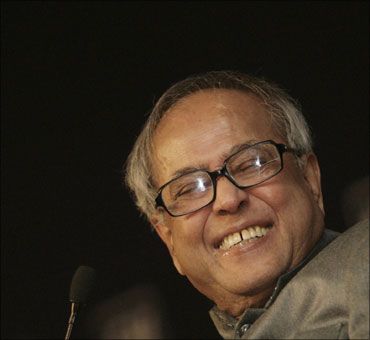

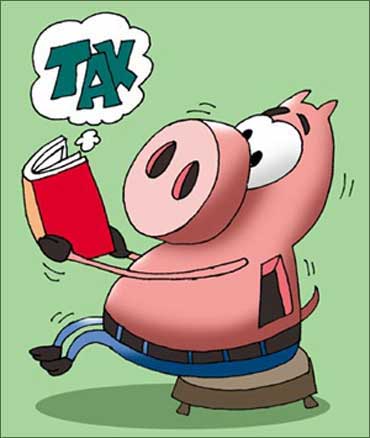

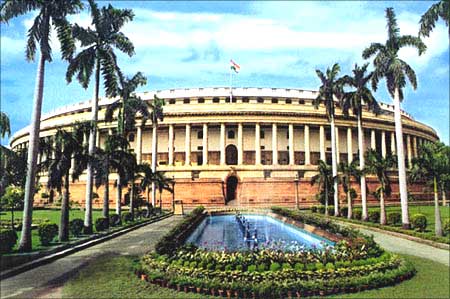
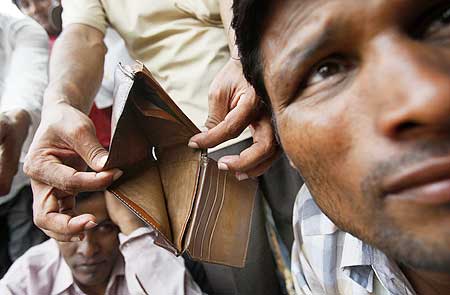

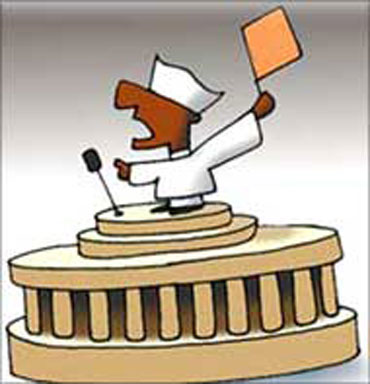
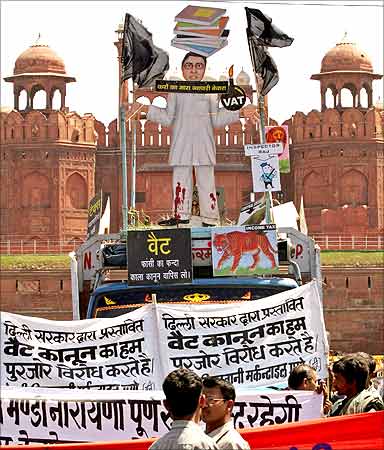



article